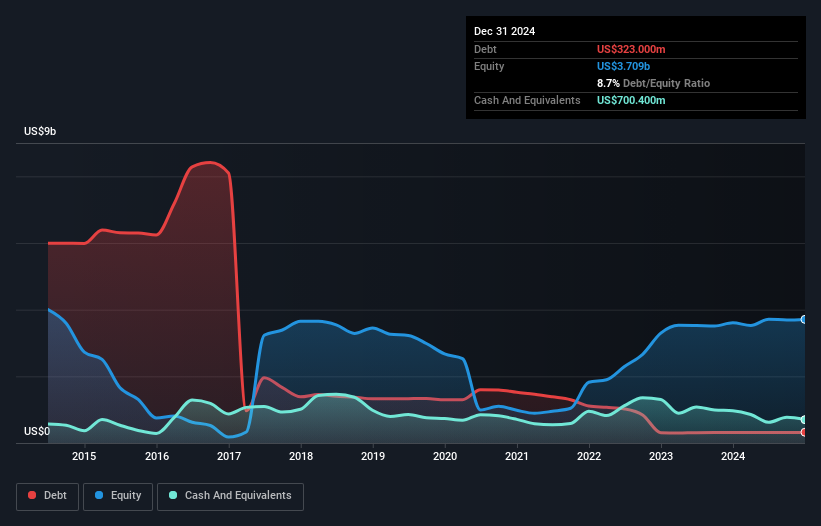
David Iben put it well when he said, 'Volatility is not a risk we care about. What we care about is avoiding the permanent loss of capital.' It's only natural to consider a company's balance sheet when you examine how risky it is, since debt is often involved when a business collapses. As with many other companies Peabody Energy Corporation (NYSE:BTU) makes use of debt. But the more important question is: how much risk is that debt creating?
Why Does Debt Bring Risk?
Debt is a tool to help businesses grow, but if a business is incapable of paying off its lenders, then it exists at their mercy. Part and parcel of capitalism is the process of 'creative destruction' where failed businesses are mercilessly liquidated by their bankers. While that is not too common, we often do see indebted companies permanently diluting shareholders because lenders force them to raise capital at a distressed price. Of course, plenty of companies use debt to fund growth, without any negative consequences. When we think about a company's use of debt, we first look at cash and debt together.
What Is Peabody Energy's Debt?
The chart below, which you can click on for greater detail, shows that Peabody Energy had US$323.0m in debt in December 2024; about the same as the year before. However, its balance sheet shows it holds US$700.4m in cash, so it actually has US$377.4m net cash.

How Strong Is Peabody Energy's Balance Sheet?
The latest balance sheet data shows that Peabody Energy had liabilities of US$827.5m due within a year, and liabilities of US$1.42b falling due after that. Offsetting this, it had US$700.4m in cash and US$359.3m in receivables that were due within 12 months. So it has liabilities totalling US$1.19b more than its cash and near-term receivables, combined.
This deficit is considerable relative to its market capitalization of US$1.67b, so it does suggest shareholders should keep an eye on Peabody Energy's use of debt. Should its lenders demand that it shore up the balance sheet, shareholders would likely face severe dilution. While it does have liabilities worth noting, Peabody Energy also has more cash than debt, so we're pretty confident it can manage its debt safely.
Check out our latest analysis for Peabody Energy
In fact Peabody Energy's saving grace is its low debt levels, because its EBIT has tanked 66% in the last twelve months. When a company sees its earnings tank, it can sometimes find its relationships with its lenders turn sour. When analysing debt levels, the balance sheet is the obvious place to start. But ultimately the future profitability of the business will decide if Peabody Energy can strengthen its balance sheet over time. So if you want to see what the professionals think, you might find this free report on analyst profit forecasts to be interesting.
Finally, a business needs free cash flow to pay off debt; accounting profits just don't cut it. While Peabody Energy has net cash on its balance sheet, it's still worth taking a look at its ability to convert earnings before interest and tax (EBIT) to free cash flow, to help us understand how quickly it is building (or eroding) that cash balance. During the last three years, Peabody Energy produced sturdy free cash flow equating to 67% of its EBIT, about what we'd expect. This cold hard cash means it can reduce its debt when it wants to.
Summing Up
While Peabody Energy does have more liabilities than liquid assets, it also has net cash of US$377.4m. And it impressed us with free cash flow of US$205m, being 67% of its EBIT. So while Peabody Energy does not have a great balance sheet, it's certainly not too bad. There's no doubt that we learn most about debt from the balance sheet. But ultimately, every company can contain risks that exist outside of the balance sheet. These risks can be hard to spot. Every company has them, and we've spotted 4 warning signs for Peabody Energy (of which 1 makes us a bit uncomfortable!) you should know about.
If you're interested in investing in businesses that can grow profits without the burden of debt, then check out this free list of growing businesses that have net cash on the balance sheet.
New: Manage All Your Stock Portfolios in One Place
We've created the ultimate portfolio companion for stock investors, and it's free.
• Connect an unlimited number of Portfolios and see your total in one currency
• Be alerted to new Warning Signs or Risks via email or mobile
• Track the Fair Value of your stocks
Have feedback on this article? Concerned about the content? Get in touch with us directly. Alternatively, email editorial-team (at) simplywallst.com.
This article by Simply Wall St is general in nature. We provide commentary based on historical data and analyst forecasts only using an unbiased methodology and our articles are not intended to be financial advice. It does not constitute a recommendation to buy or sell any stock, and does not take account of your objectives, or your financial situation. We aim to bring you long-term focused analysis driven by fundamental data. Note that our analysis may not factor in the latest price-sensitive company announcements or qualitative material. Simply Wall St has no position in any stocks mentioned.
About NYSE:BTU
Flawless balance sheet and undervalued.
Market Insights
Community Narratives



